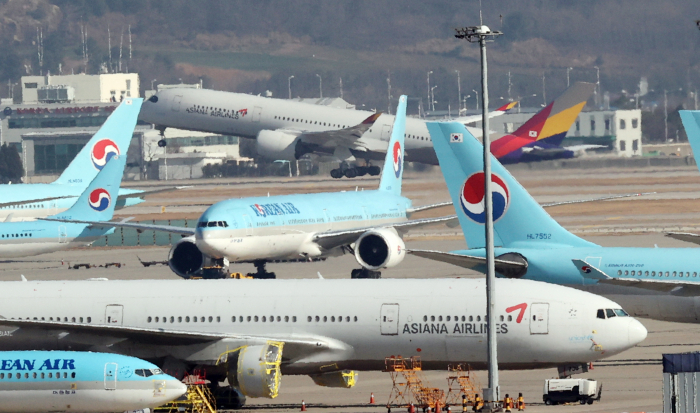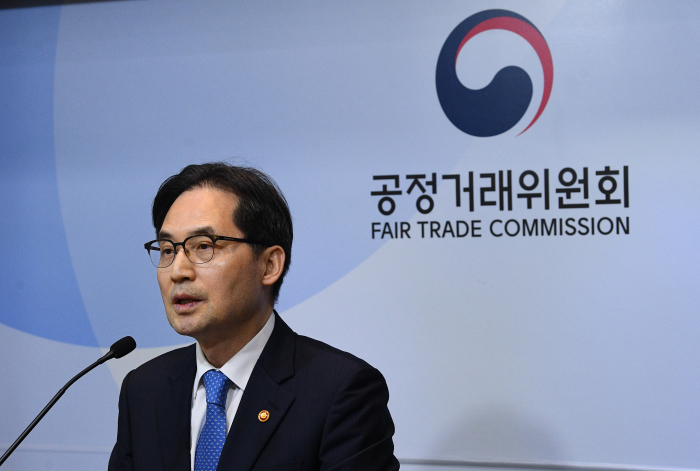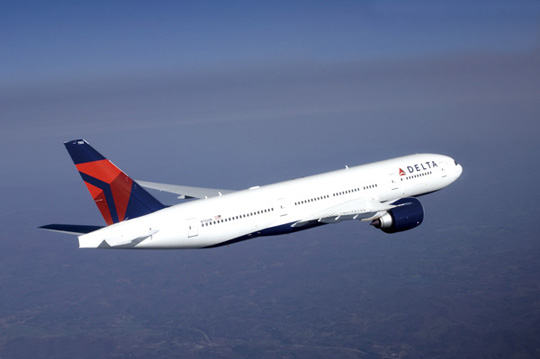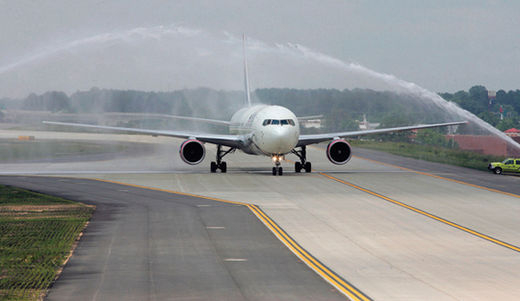Airlines
US antitrust body blocks $1.4 bn Korean Air-Asiana deal
The justice department says the deal should not create a monopoly player in S. Korea's aviation market
By May 22, 2023 (Gmt+09:00)
4
Min read
Most Read
LG Chem to sell water filter business to Glenwood PE for $692 million


KT&G eyes overseas M&A after rejecting activist fund's offer


Kyobo Life poised to buy Japan’s SBI Group-owned savings bank


StockX in merger talks with Naver’s online reseller Kream


Meritz backs half of ex-manager’s $210 mn hedge fund



Korean Air Lines Co. ’s acquisition of smaller domestic rival Asiana Airlines Inc. is poised to collapse after the US antitrust agency raised a hurdle to approval of the 1.8 trillion won ($1.4 billion) deal, according to people with knowledge of the situation on Monday.
The US Department of Justice (DOJ), reviewing the Korean Air-Asiana merger, recently notified Korean Air of its decision to reject the purchase of Asiana if the deal leads to the creation of a dominant player with no formidable rival in South Korea's aviation industry.
Industry observers said the condition is hard for Korean Air to accept and would lead to the collapse of their merger.
To address monopoly concerns, Korean Air had proposed handing some of its international routes to Korea's low-cost carrier Air Premia Inc. Air Premia, an industry newcomer, is expanding its international routes.
But the DOJ denied that proposal, saying Air Premia wouldn't be competitive enough to challenge the combined entity of Korean Air and Asiana, the sources told The Korea Economic Daily.
EVEN TOUGHER
The US antitrust body’s requirement as a condition for approval is tougher than those made by the UK and the European Union (EU).
The UK gave the deal the green light on the condition the two Korean carriers relinquish a portion of their landing and takeoff slots.
The EU has yet to announce the conclusion of its review. It asked both Korean Air and Asiana to immediately give up some of their airport slots and traffic rights.

Last year, the Korea Fair Trade Commission (FTC) approved the merger, but echoed the conditions required by the EU to resolve monopoly concerns.
The FTC said the merger could hurt competition on 26 international and 14 domestic routes among the two companies’ 87 overlapping routes.
Their merged entity would take up more than 70% of the Korean aviation industry’s international passenger routes and cargo lines.
The DOJ’s decision will likely thwart the Korean Air-Asiana merger, still subject to approval from the US, the EU and Japan. Other countries affected by the deal have cleared the way for the merger.
It would mark the first time the US sought to foil a merger between foreign airlines.
The Korean Air-Asiana deal is the latest in a series of takeover deals blocked by US and European regulators, which have tightened their scrutiny over M&As amid growing nationalism.

Last year, the EU thwarted the combining of Hyundai Heavy Industries Co. and Daewoo Shipbuilding & Marine Engineering Co., the world’s two largest shipbuilders, citing monopoly concerns.
In 2021, Canada’s largest carrier Air Canada called off its $190 million takeover of the country’s No. 3 carrier Transat AT after failing to win approval from the EU.
The same year, the EU also put the brakes on Spain’s No. 1 carrier International Airlines Group’s (IAG)’s initial attempt to buy Air Europa in 2021.
SKYTEAM AND STAR ALLIANCES
Among 13 routes to and from the US, five — San Francisco, Honolulu, New York, Los Angeles and Seattle — are the heaviest for Incheon International Airport, Korea's largest gateway.
United Airlines is the only major competitor to Korean Air and Asiana on the Seoul-San Francisco route, handling just 20% of passenger and cargo demand along that route.
The other four busy Korea-US routes are split by Korean Air and its SkyTeam alliance partner Delta Air Lines, as well as Asiana Airlines.
For Honolulu, Hawaiian Airlines is the lone competitor.
United Airlines has an unfavorable view of the proposed Korean Air-Asiana merger.
Korean Air's purchase of Asiana would mean losing one of its Star Alliance partners, which could put a dent in its US-Korea flight services, including its stopovers in Seoul en route to China and Southeast Asia.

HOW TO RETRIEVE PUBLIC MONEY?
A failure to sell Asiana to Korean Air would delay the retrieval of taxpayer funds injected into Asiana and other ailing companies in the wake of the 2007-08 global financial crisis.
The Korea Development Bank (KDB) kept these companies afloat with public money as it led their restructuring on hopes of finding new owners.
The state-run lender is being blamed for the prospective collapse of the Korean Air-Asiana deal and the botched Hyundai Heavy-Daewoo Shipbuilding deal.
Some market observers said the KDB should have been more prudent in finding their buyers, keeping up with changes in the antitrust regulatory environment.
KDB has poured some 800 billion won into Korean Air's parent company Hanjin KAL Corp. through the purchase of new shares to support its acquisition of Asiana.
Recovering the money anytime soon seems unlikely. Shares in Hanjin KAL now trade at about 35% below their 2020 issuance price of 70,800 won each.
“It looks impossible for it to go through,” said a government official in charge of reviewing the Korean Air-Asiana merger. "The US justice ministry seemed to have made a reasonable conclusion.”
For its part, Korean Air said it was doing its best to complete the merger with Asiana.
Write to Zi-Hoon Lee, Jong-Kwan Park and Hyung-Kyu Kim at lizi@hankyung.com
Yeonhee Kim edited this article
More to Read
-

-

-
 Mergers & AcquisitionsUS extends antitrust review of Korean Air-Asiana merger
Mergers & AcquisitionsUS extends antitrust review of Korean Air-Asiana mergerNov 16, 2022 (Gmt+09:00)
1 Min read -
 Mergers & AcquisitionsKorean Air vows to get nod from all antitrust bodies for Asiana merger
Mergers & AcquisitionsKorean Air vows to get nod from all antitrust bodies for Asiana mergerMay 23, 2022 (Gmt+09:00)
2 Min read -
 Mergers & AcquisitionsKorean Air-Asiana deal girds for tough US challenge
Mergers & AcquisitionsKorean Air-Asiana deal girds for tough US challengeApr 22, 2022 (Gmt+09:00)
2 Min read -
 Mergers & AcquisitionsKorea approves Korean Air-Asiana merger; hurdles remain
Mergers & AcquisitionsKorea approves Korean Air-Asiana merger; hurdles remainFeb 22, 2022 (Gmt+09:00)
3 Min read -
 Mergers & AcquisitionsSingapore approves Korean Air-Asiana combination
Mergers & AcquisitionsSingapore approves Korean Air-Asiana combinationFeb 09, 2022 (Gmt+09:00)
1 Min read -
 Mergers & AcquisitionsKorean Air wary of Asiana deal after EU blocks HHI-DSME merger
Mergers & AcquisitionsKorean Air wary of Asiana deal after EU blocks HHI-DSME mergerJan 14, 2022 (Gmt+09:00)
2 Min read
Comment 0
LOG IN


